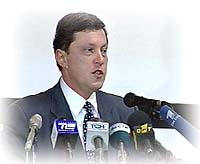|
 The
leader of the Yabloko faction of the State Duma Grigory Yavlinsky
shares his opinion with our readers on ten years of reforms in
Russia. The
leader of the Yabloko faction of the State Duma Grigory Yavlinsky
shares his opinion with our readers on ten years of reforms in
Russia.
Question: Grigory Alexeevich, how would you assess 10 years later
the reforms conducted by Yegor Gaidar's government at the beginning
of the 1990s?
YAVLINSKY: History does not include a subjunctive tense:
what is done is done. The results of the reforms are reflected
in the economic indices, such as the world rating of Russia's
economic development and volume of investments in its economy.
Qualitatively the results of the reforms were partially reflected
in the crisis of 1998, based on the fact that we still don't have
a financial market and a banking system.
You do not have to draw up some results, you merely need to look
around you. Look at the recent indices of the Russian Trading
System, read how the leaders of the Sibur company live, read about
the present relations between the "liberals" and the
"KGB", recollect how many young talented people have
left the country. These are the results of the reforms.
Q: Can't you name any positive results?
YAVLINSKY: The most visible result of 1992-1993 is a saturation
of the commodity market. In 1980s it was possible to buy virtually
everything at the Chernyomushki market in Moscow, but all these
products, were in economic terms sold at prohibitive prices. It
was possible to buy anything, but very few could afford this pleasure.
First Moscow, and then the whole country, was transformed into
such a market.
Q: You are the author of the well-known programme "500
Days". How would you have conducted reforms then?
YAVLINSKY: Once again I must repeat: what is done is done,
history does not know the subjunctive tense. As an economist I
can only assess what has actually happened. It would be idle talk
for an economist to start speaking today about how all this could
have been done differently. At the same time my views are well-known:
at the time I expressed them in the "500 Days" programme.
The initial point of the programme is as follows. At the beginning
of the 1990s population held considerable amounts of cash. At
the same time the country experienced huge shortages of commodities.
To balance supply and demand - and it was important to do this
to create incentives for economic development - the programme
proposed sales to the population of state property at symbolic
prices to reflect the population's solvency rather than market
relationships. On the very first day of the launch of these reforms,
the government would have been forced to announce that the state
with all its institutions would protect private property.
The sale of state property had to serve as the basis for the
creation of private property and a market. It involved at the
start the sale to the population of small shops, hairdressers',
small-scale community services enterprises, lorries and then plots
of land, dachas and flats. This would be accompanied simultaneously
by a liberalisation of prices.
It had to involve an initial accumulation of capital through
a thousand-fold increase in the number of cooperatives. Then we
could switch to privatisation of big enterprises This should have
happened over 18 months.
Question: Do you really believe that it was possible to transfer
within 500 days from a planned economy to a market economy?
YAVLINSKY: The programme envisaged only a plan of actions
for the first 18 months rather than the creation of a market economy.
Of course, this plan would have needed a second stage, that would
have been adjusted, based on the results of the first stage of
the reforms. It is difficult to guess now how many years the reforms
would have taken.
Question: Today do you think that at that period the programme
was the only possible variant of transformations?
YAVLINSKY: Certainly, there would have been a lot of problems.
But I am sure that we would not have witnessed 2,600% inflation.
Question: Was it possible to conduct reforms with a lesser
social shock?
YAVLINSKY: Over the years the government did not even
assume such a task. They thought simply: "Nothing will happen
to the people. And if something happens, this serves them right.
The goal is to build capitalism and a market." And this goal
justified all the means.
Vouchers (Ed. privatisation cheques were called vouchers in Russia)
were introduced to ensure equal distribution of property. And
the fact that later some people profited at other peoples' expense
meant that they got what they deserved and would smarter from
then on. The strongest would survive and nobody would be responsible
for everybody else.
Question: Reforms are also being conducted in Russia today.
Do these reforms represent the transformations required by the
country or has the government opted for the wrong path again?
YAVLINSKY: I don't even know what the government means
by 'reforms' now. Do they mean that the reform is represented
by a 35% increase in railroad tariffs? Is disconnection of electricity
supplies also a reform? Is it a reform to make people pay 100%
for their? This is a sign that there are simply no reforms.
We live owing to high oil prices and the consequences of the
default. Devaluation of the rouble allows us to get by for some
more time to come. Today a considerable number of the largest
monopolies are interested in a weak rouble, as in this case exports
become extremely profitable. Any appreciation of the rouble will
force them to compete intensely with each other not only on price,
but also on quality. That is why we still have a weak rouble.
That is why our country in general gets poorer and some monopolists
get richer.
See also:
"500 Days" programme
|